The much-anticipated Salesforce and Alibaba Cloud partnership is finally in action. Three additional Salesforce products have officially landed in China, exclusively provided by Alibaba, in December 2023. This collaboration is particularly beneficial for businesses aiming to enter or expand in the region, especially multinational companies.
In this article, we’ll dive into Salesforce China, exploring the unique market challenges and how its tailored solutions can help brands build comprehensive CRM, boost sales, and foster customer loyalty.
Table of Contents
What to Know about the China Market – Challenges & Opportunities
China’s vast size and rapid growth make it an appealing market for global brands. The 2023 China Marketing & Media Trends Report by Totem reveals that there are 4 to 12 more top brands per category in China.
However, navigating the Chinese market requires a clear understanding of its unique dynamics. Despite years of presence, many brands still lack a fundamental understanding of China, shaped significantly by its distinctive digital landscape.
This knowledge gap often leaves brands uncertain about where to begin and how to allocate their budget and resources effectively. Without adequate preparation, this can lead to unsuccessful market entry or, in some cases, eventual retreats and exits.
At ITC, we are committed to education and knowledge sharing to support success in the Chinese market.
Outlined below are 3 fundamental challenges, including regulatory and technological hurdles, that all brands must be aware of when operating China:
Complex Data Regulations
Understanding and adhering to data regulations in China is a dynamic and evolving challenge.
While brands may be accustomed to working with global data protection frameworks, like the General Data Protection Regulations (GDPR), they should be aware that China’s regulatory landscape is different.
The country has its own set of frameworks, including the Cyber Security Law (CSL), Personal Information Protection Law (PIPL), and Data Security Law (DSL), each with distinct characteristics.
For example, in terms of the applicable scope alone:
- The GDPR emphasizes the location of business establishment
- The China PIPL focuses on where the data are store and where personal information processing activities occur. This means entities outside China working with Chinese data must still comply
Brands must carefully consider how data is processed and whether it is stored inside China to maintain compliance with local regulations. Obtaining authorization for accessing information is crucial.
To meet legal requirements, many companies choose to store consumer data and set up their infrastructure within China. This aligns with ITC’s general recommendation to our clients and partners.
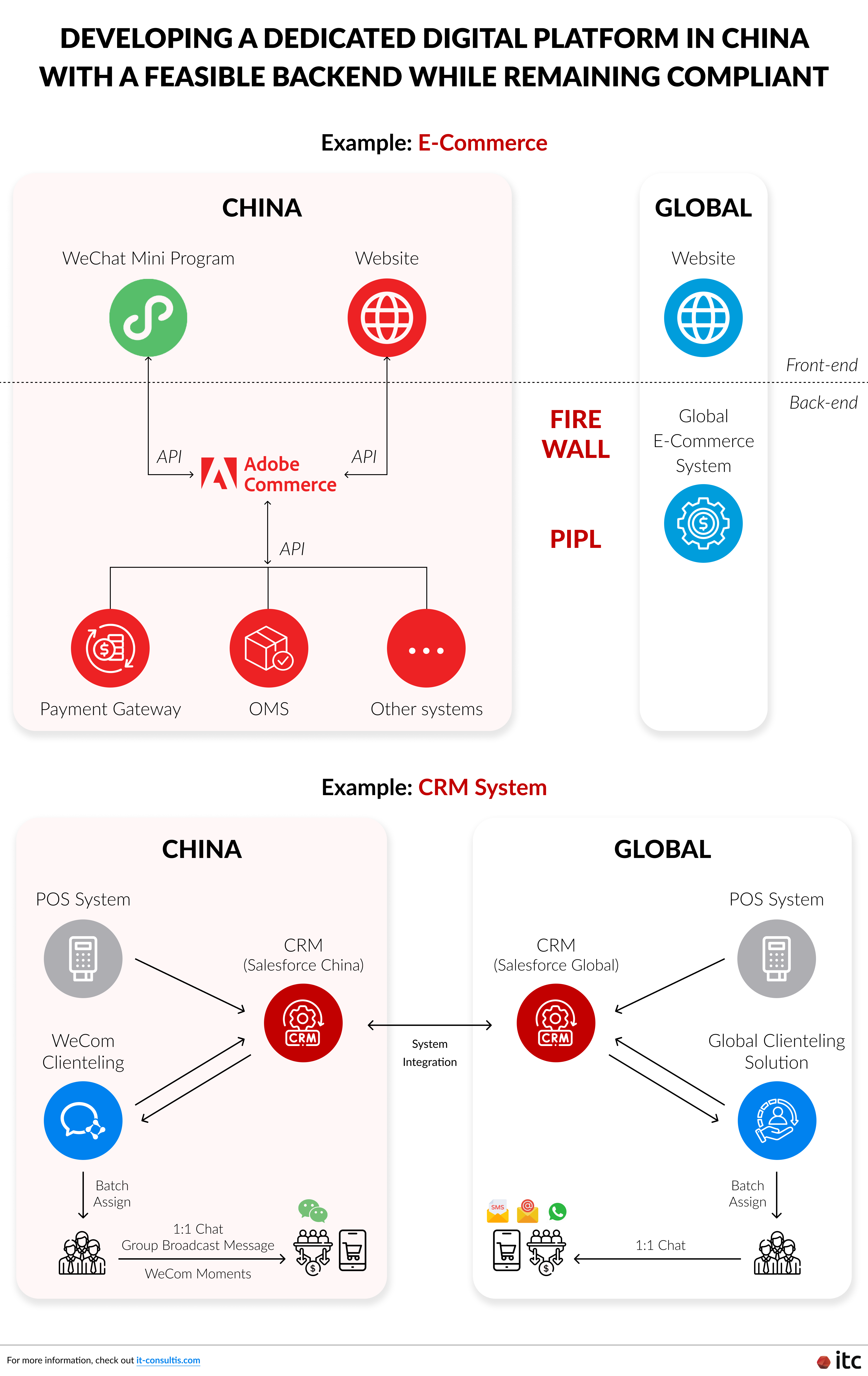
Distinctive Market Dynamics
Interactions between companies and customers in China differ fundamentally from those in other countries and regions.
China’s digital market is dominated by the 4 giants — Baidu, Alibaba, Tencent, and ByteDance — collectively known as “BATB,” capturing the majority of user attention.
The landscape has evolved further with the advent of real-time, location-based internet services, AI-powered algorithms, and multimedia, giving rise to the second and third waves of tech giants known as “TMD” (Toutiao/Douyin, Meituan, and Didi) and “PKB” (Pingduoduo, Kuaishou, and Bilibili).
While initially resembling Western markets dominated by Google, Amazon, and Facebook, these Chinese counterparts have transformed into “super-apps”. These platforms offer a wide range of services, including social networking, e-commerce, entertainment, search, payments, and more.
This transformation has significantly altered how brands engage with customers, integrating multiple independent features to provide a unified user experience.
This empowerment allows marketers, Sales Associates, Client Advisors, and Customer Service staff to deliver personalized shopping experiences through real-time engaging interactions.
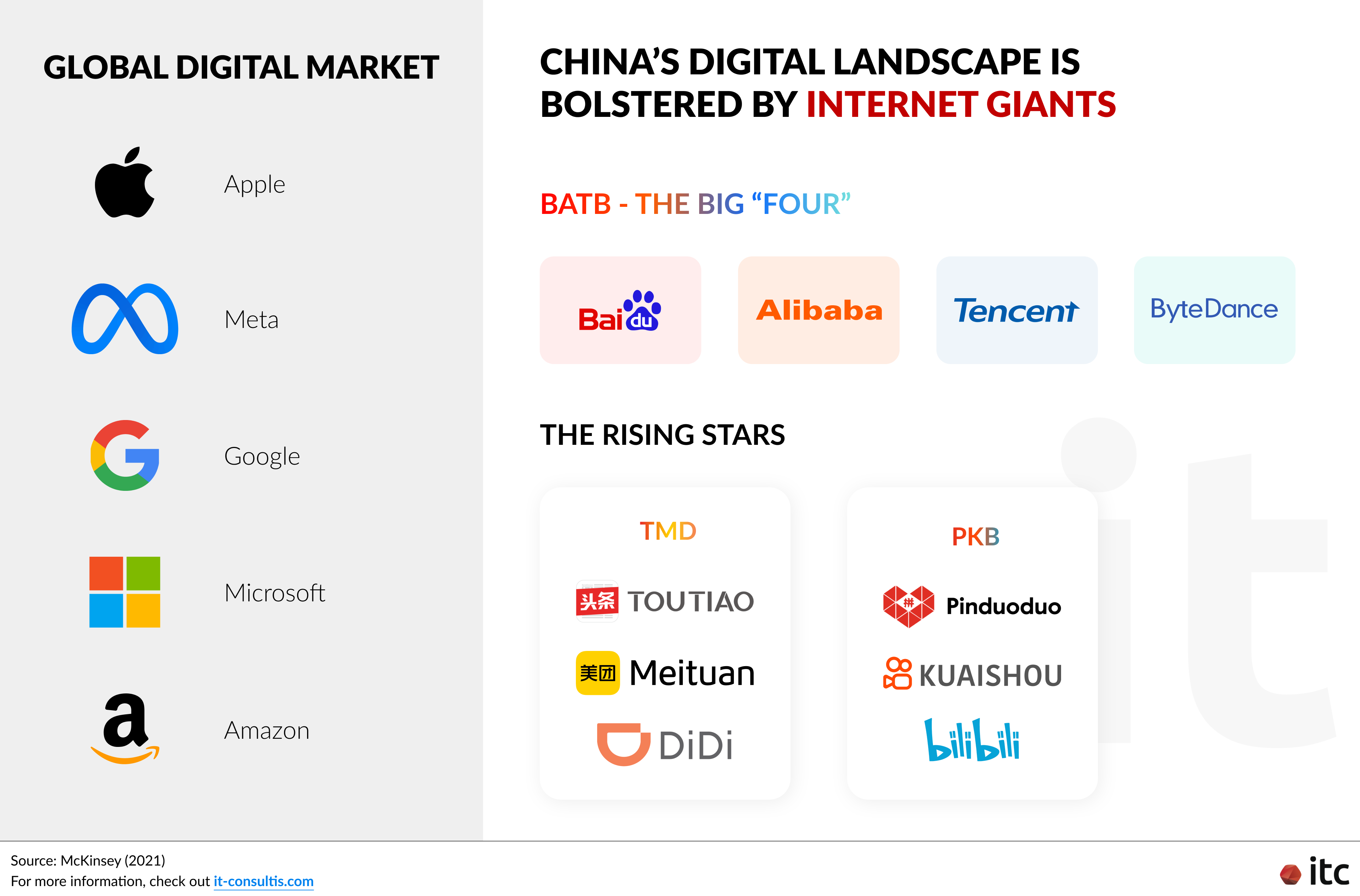
Performance Considerations
China’s network challenges can create unique hurdles, especially when dealing with cross-country access that can noticeably affect response times.
Given customer expectations for swift responses from applications and services, businesses need to strategize to minimize this impact and guarantee an optimal experience for their Chinese customers. Consider the following:
- Dedicated Infrastructure: Host the digital enabler, such as an eCommerce WeChat Mini Program or website, on dedicated infrastructure within China.
- Content Delivery Network (CDN): Utilize a Content Delivery Network to efficiently transfer cached content to users, further enhancing the speed and responsiveness of applications and services.
How Salesforce China Can Empower Businesses with Localized Solutions
To tackle these challenges effectively, Salesforce and Alibaba Cloud have introduced a localized version of Customer 360. This integrated CRM solution connects all company departments, providing a comprehensive profile view of customer data.
This localization initiative facilitates seamless collaboration among different teams throughout the customer journey. It empowers them to deliver personalized experiences, boost conversions, and foster enduring relationships.
Salesforce CRM China, in partnership with Alibaba, has adapted its products to cater to the region’s specific needs. This collaboration enhances both companies’ service offerings, aiding businesses in China — especially multinational corporations — in the following ways:
- Address Evolving Market Demands: Utilize data analytics, consumer insights tools, and marketing automation solutions to meet the dynamic demands of the Chinese market and understand cultural contexts.
- Ensure Compliance with Data Residency Regulations: Leverage Alibaba Cloud to adhere to the latest data residency regulations, ensuring that Chinese customer data is stored and processed in the right country/region.
- Facilitate Integration: Streamline integration between local and global tech ecosystems, including the CRM system.
- Empower Customer Engagement Platforms: Enable eCommerce enablers and other dedicated customer engagement platforms, such as clienteling and customer service, specifically tailored for the Chinese market.
- Optimize Performance: Maximize performance for both the Chinese and global markets using AliCloud’s secure and compliant cloud infrastructure and localization services.
Salesforce China – Key Salesforce Products
Below are 4 Salesforce solutions that are now available in China.
Hosted by Alibaba Cloud and operating on its infrastructure, these solutions empower enterprises of all kinds to fully harness the Salesforce CRM (Customer Relationship Management) platform for their Chinese customers—the core of the 360 strategy.
These products provide businesses in China with a wide array of automation and workflow tools to enhance their sales and service processes.
Salesforce Platform China
The Cloud Platform is a low-code application development platform that expands the capabilities of CRM. Using an easy drag-and-drop interface, brands can create, test, and deploy applications to automate business processes, enhancing efficiency across workflows, users, departments, or industries.
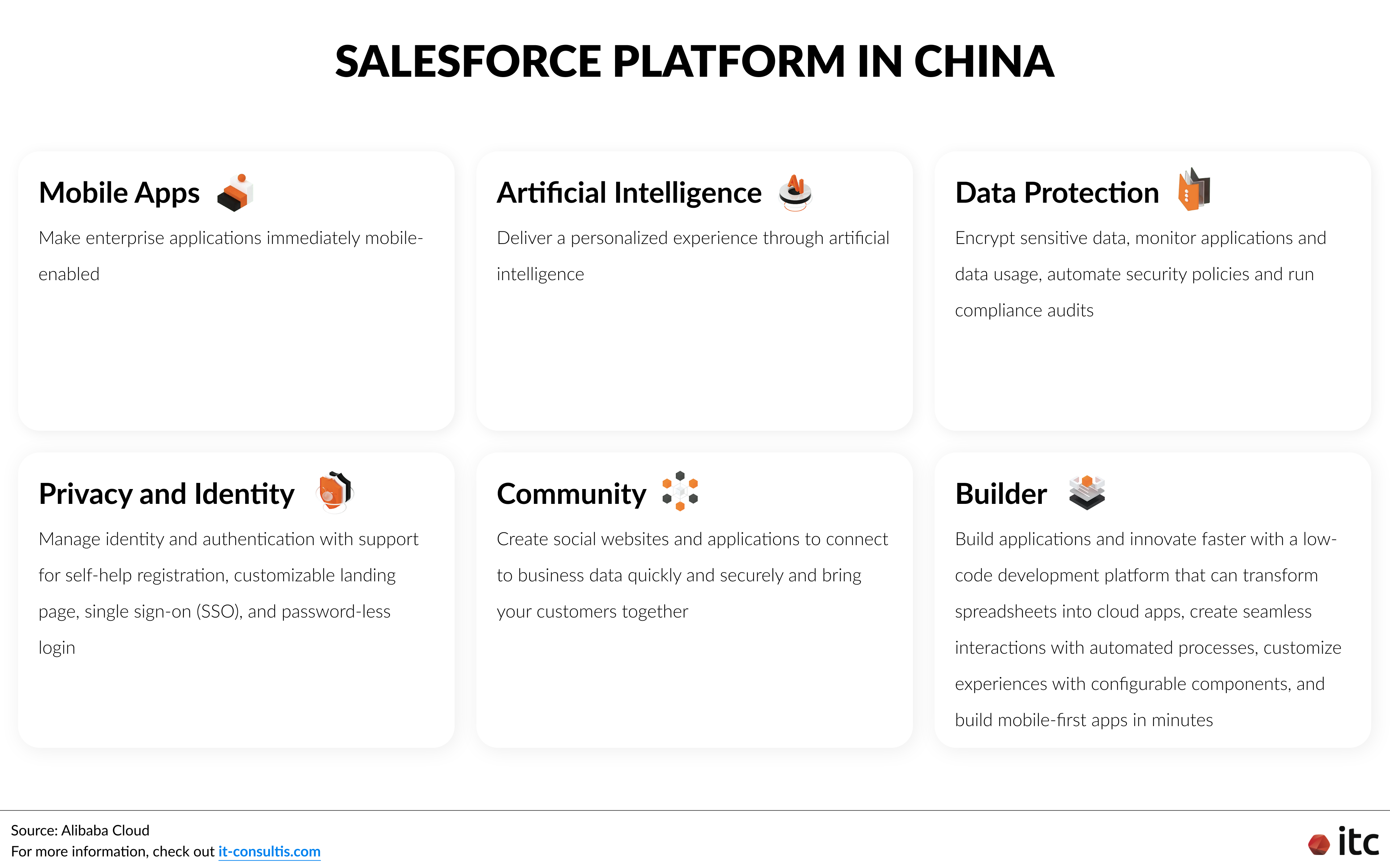
Salesforce Sales Cloud China
Salesforce Sales Cloud is a sales management software (sales growth platform) designed to empower sales teams. It facilitates the sales lead identification, customer relationships management, sales progress tracking, and processes automation to expedite deal closures and drive revenue.
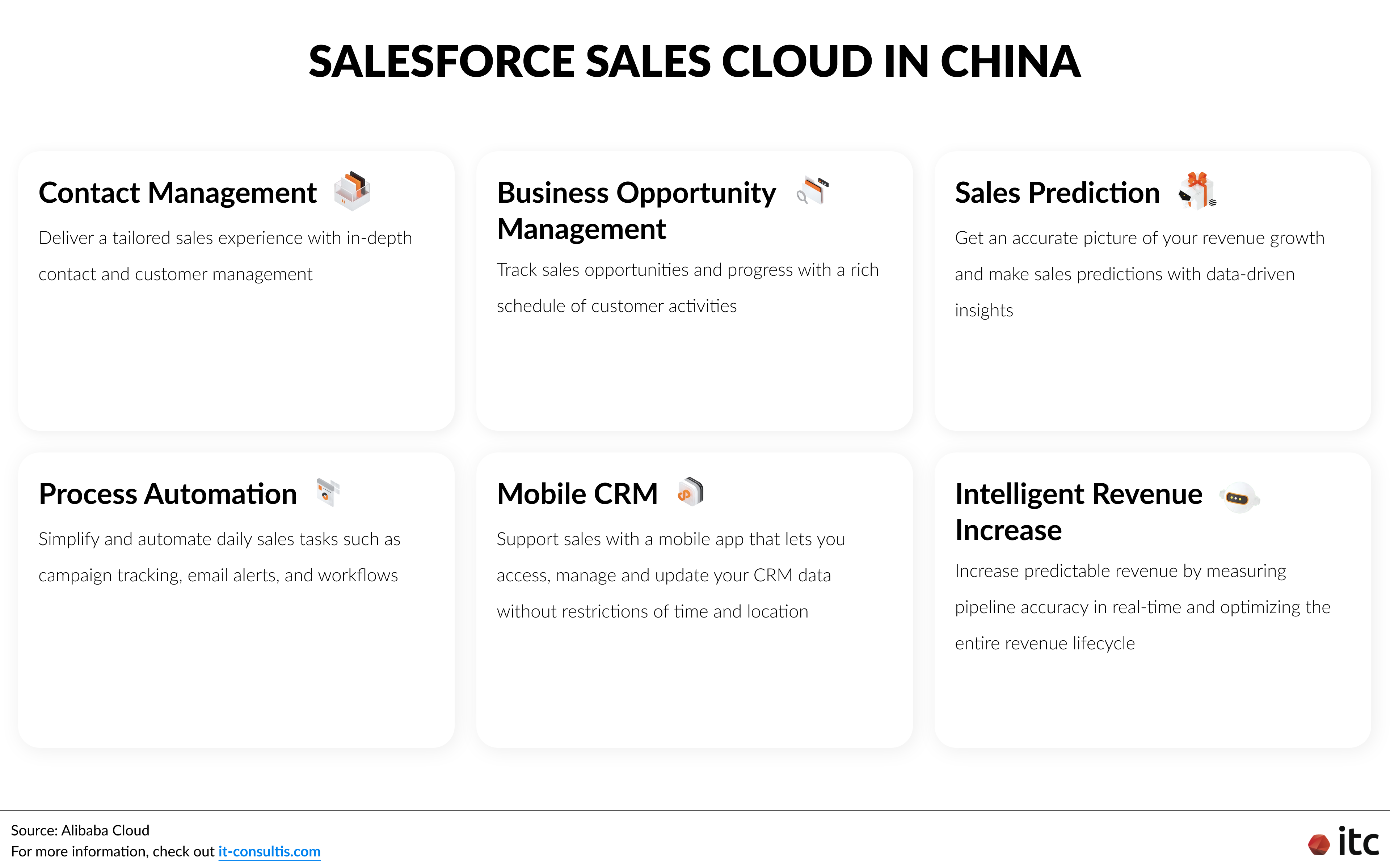
Salesforce Service Cloud China
Service Cloud is a customer service platform that revolutionizes how service teams deliver value at every customer touchpoint. It encompasses customer experience, engagement, processes, automation, service operations systems, pre-built integrated applications, ticket management, knowledge base, and queue management.
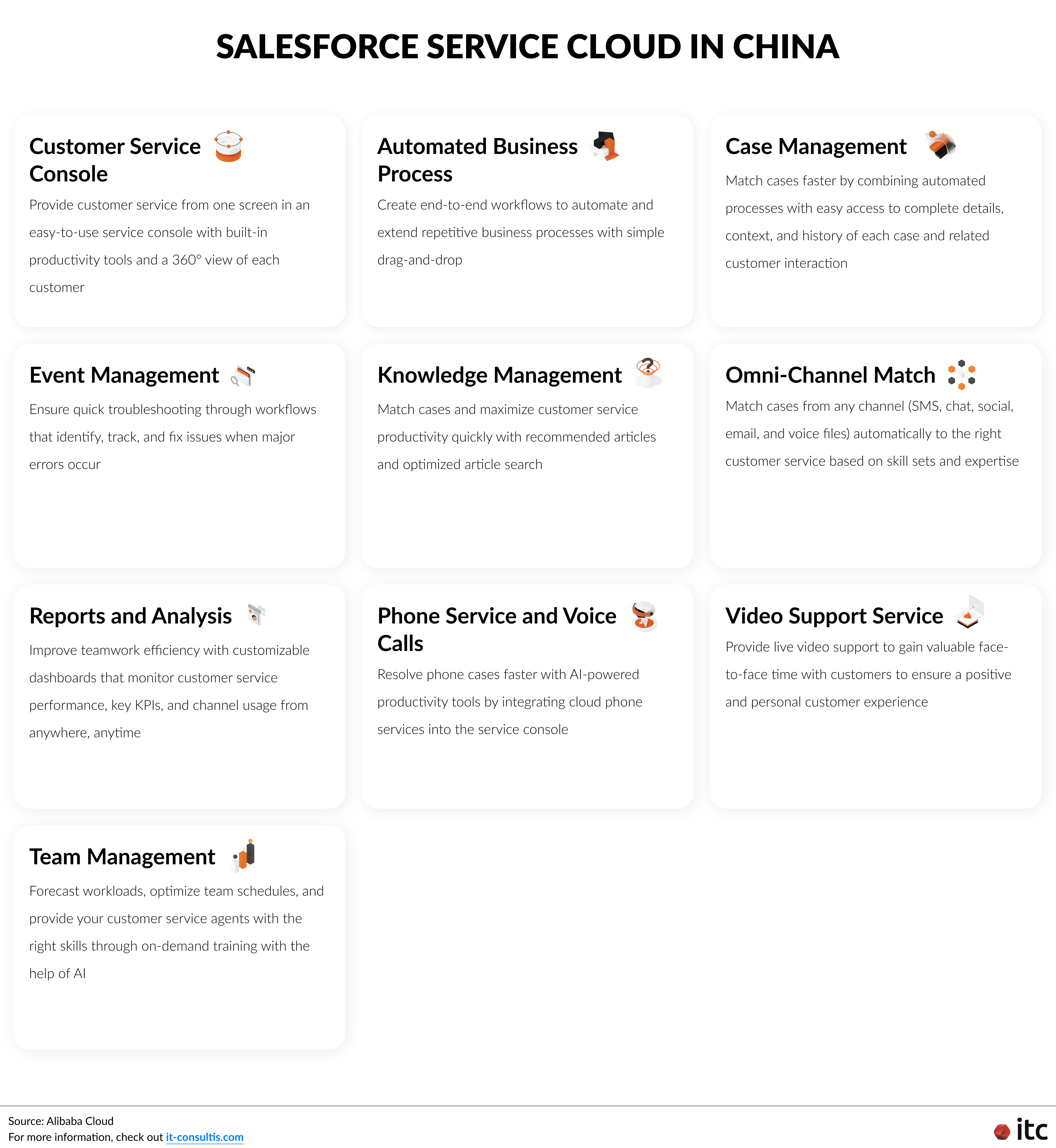
Salesforce Social Commerce China
A headless commerce platform, Salesforce Social Commerce assists brands in seamlessly overseeing and integrating e-commerce channels such as websites, mobile applications, and mini-programs.
By providing a comprehensive 360° customer view, it enhances customer experience and fuels business growth for brands in China.
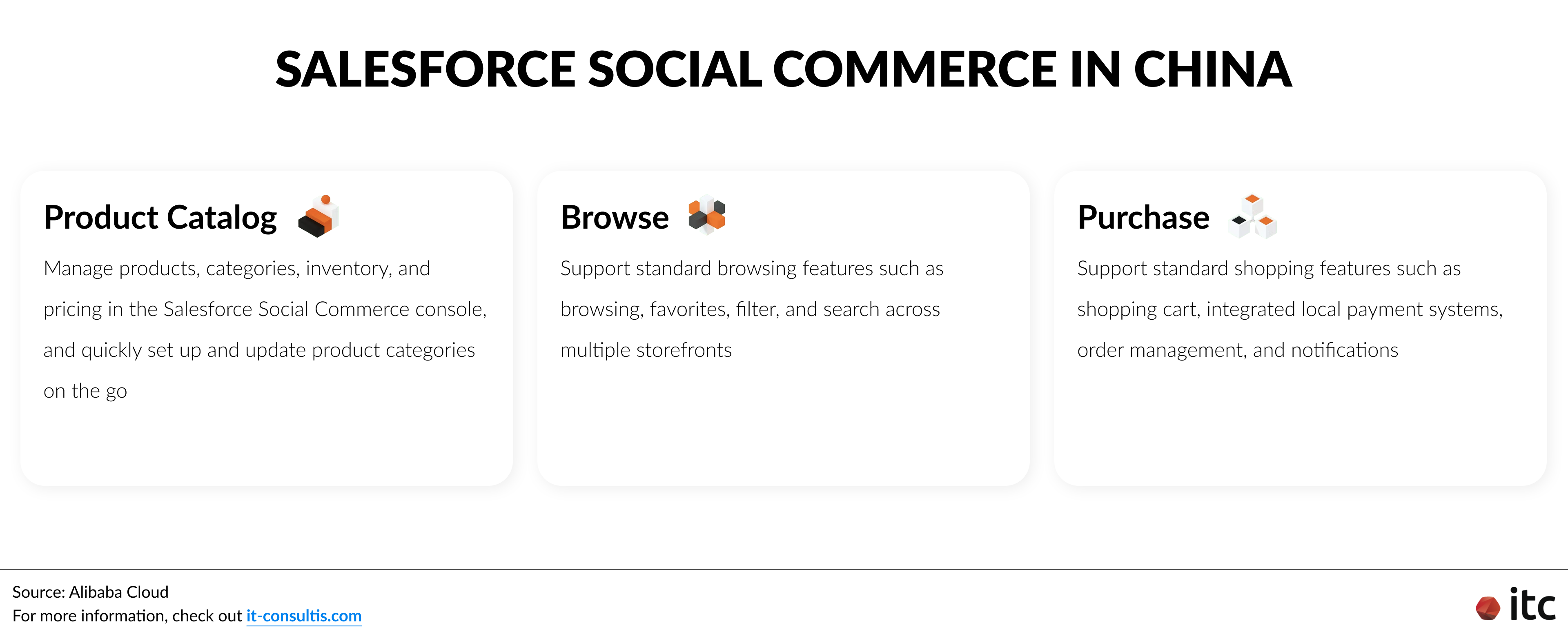
Incorporating Salesforce CRM China into Your Digital Strategy
By integrating Salesforce as your CRM system to centralize data and create comprehensive customer profiles, you empower every touchpoint and team with valuable insights for personalization and automation.
This ensures that each decision-maker and key employee (in Marketing, CRM, Retail, Sales, etc.) has configured access to the customer data, enabling them to make informed decisions, respond promptly to customer needs, and anticipate new opportunities, boosting efficiency and conversion rates.
Key benefits include:
- Sales Team Empowerment: Streamline the entire sales pipeline from prospecting to sale. Integrate with dedicated clienteling tools in China, such as WeCom, to enhance personalized engagement with customers on platforms like WeChat and nurture them to conversion for Sales Associates and Client Advisors.
- Marketing Team Optimization: Utilize live data to assess customer engagement with marketing assets. Optimize campaigns and content publication based on real-time insights to maximize reach and engagement.
- Service Team Efficiency: Provide Customer Service representatives with easy access to information, offering a holistic view of each case. This enables quick responses to customers’ needs.
However, as these Salesforce China products were only recently launched, these questions persist and ITC will help you navigate them:
- How well will the 4 Salesforce CRM solutions be integrated?
- Will leveraging the 4 Salesforce solutions, which would centralize all data on Salesforce, be more advantageous than implementing additional integrations of various China-dedicated systems (e.g., WeCom, Social CRM, etc.)?
- How will the absence of the Einstein AI service* impact the value of Salesforce China products? Will the integration of the upcoming ChatGPT-like AI model by Alibaba be sufficient, especially for the product recommendation engine? Or should companies seek alternative solutions in the meantime?
*Due to compliance concerns according to the Salesforce Technology Migration Data Manual on Alibaba Cloud
Ultimately, the decision to switch from local SaaS solutions or other systems to Salesforce CRM offerings (all 4 or fewer) in China should be based on a case-by-case discussion.
As an award-winning digital transformation agency in China and Asia, IT Consultis (ITC) is partnering up with Salesforce China to assist you in onboarding Salesforce CRM and integrating it with your China and global systems. This effective streamlining of data flow accelerates sales generation while ensuring compliance with local regulations.
In addition, ITC can help guide your global and local team to incorporate it into your short- and long-term digital strategy and execution playbook in China for sustainable success.




